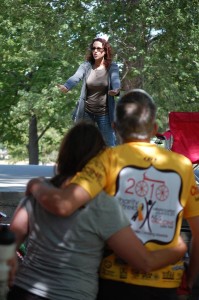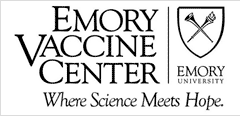The Charity Treks HIV/AIDS Vaccine Bike Treks benefit two organizations that have a great impact on finding a vaccine for AIDS. All funds raised by Charity Treks are donated to the Emory Vaccine Center and the UCLA AIDS Institute. Click on the links on the left to learn more about these important organizations.
The UCLA AIDS Institute is proud to partner with Charity Treks to address one of the most pressing needs for those impacted by HIV/AIDS: the need for an effective vaccine.
UCLA has long been committed to the fight against this deadly disease, from the moment when the first AIDS cases were recorded, in the UCLA Medical Center in 1981, to the present day where over one hundred Faculty members are leading teams of researchers, battling the virus from every direction. Since 1981, tremendous progress has been made in understanding and treating this disease. What was once a brutal and deadly assault on the immune system is now, with the aid of powerful medication, a manageable disease. This same medication was found, by a team which included UCLA researchers, to prevent transmission of HIV from mother to child, opening up the possibility of a HIV-free generation in some of the hardest-hit African nations.
Yet a HIV vaccine remains elusive. Why is this so, when many other successful vaccines have been developed? There are two reasons why this virus in particular is challenging. The first is it’s rare ability to mutate while it grows; actually the result of a flaw in the growth mechanism which introduces lots of errors into its genetic code, but one which also allows it to change it’s “shape” constantly and escape recognition by the body’s immune system. As a vaccine works by teaching the immune system what to “look for” and attack, by mutating so frequently HIV can avoid being recognized.
The second reason is that vaccines try to mimic the body’s natural response to a virus, i.e. they trick the immune system into thinking it’s already seen the virus before (when actually what its seen is the vaccine) so it can mount a strong response when it encounters the real thing. But researchers have found that when HIV infects someone, the immune system doesn’t react in the same way that it does with other viruses. The immune response is much weaker, and, unlike most other viruses, HIV attacks the very cells that are trying to fight infection. So in trying to mimic a “normal” response to HIV to teach the immune system what to do, there’s not enough to mimic! It’s become clear, over the 30 frustrating years of HIV vaccine research, that HIV is no ordinary virus and fighting it will require a new approach.
 This is exactly what researchers at UCLA are focused on, as they surround this question from every angle. Dr. Otto Yang is investigating how to boost the CD8 immune cells (“killer” T cells), which can kill HIV-infected cells without themselves being attacked. Drs. Zack and Kitchen are investigating how to generate more HIV-killing CD8 T cells, using stem cells from the same patient so they won’t be rejected. Dr. Kathie Ferbas is investigating ways to cripple HIV and turn it back into a vaccine that the immune system can recognize and use to prime itself against a real HIV attack. Dr. Ronald Mitsuyasu is investigating whether DNA (instead of protein) is better at teaching the immune system how to recognize HIV. Finally, using money donated by Charity Treks for the first Charity Treks Research Seed Grant, Dr. Lenny Rome is investigating using protein structures called “vaults”, which are natural parts of cells, to deliver pieces of HIV precisely to the cells that need to “learn” how to recognize them.
This is exactly what researchers at UCLA are focused on, as they surround this question from every angle. Dr. Otto Yang is investigating how to boost the CD8 immune cells (“killer” T cells), which can kill HIV-infected cells without themselves being attacked. Drs. Zack and Kitchen are investigating how to generate more HIV-killing CD8 T cells, using stem cells from the same patient so they won’t be rejected. Dr. Kathie Ferbas is investigating ways to cripple HIV and turn it back into a vaccine that the immune system can recognize and use to prime itself against a real HIV attack. Dr. Ronald Mitsuyasu is investigating whether DNA (instead of protein) is better at teaching the immune system how to recognize HIV. Finally, using money donated by Charity Treks for the first Charity Treks Research Seed Grant, Dr. Lenny Rome is investigating using protein structures called “vaults”, which are natural parts of cells, to deliver pieces of HIV precisely to the cells that need to “learn” how to recognize them.
UCLA Faculty members have been honored to attend the Charity Treks rides over many years. Dr. Kathie Ferbas (pictured, left) and Dr. Beth Jamieson have been inspired by the commitment and dedication of the Charity Treks team in their visits to the event. They have traveled with riders, talked to them about HIV research and listened as they answer the question “I ride because . . .”.
The Faculty and researchers at the UCLA AIDS Institute look forward to a productive partnership with Charity Treks in our shared journey towards an AIDS vaccine.
Website: aidsinstitute.ucla.edu/ (link opens in new tab).
Although there have been significant advances in treatment and prevention of HIV/AIDS in recent years, there are still millions of new infections annually worldwide. We still desperately need an effective AIDS vaccine and the Emory Vaccine Center is at the forefront of the global effort to save millions of lives from the scourge of HIV. With the help of Charity Treks, our scientists are making extraordinary advances in understanding the virus and our immune system and creating vaccines to prevent and treat HIV infection.
The Emory Vaccine Center developed one of the world’s first AIDS vaccines, created by Dr. Harriet Robinson’s research team. After successfully preventing infection in primates, early results in human trials indicate an excellent safety profile and highly reproducible immunogenicity. Testing in humans continues and is chronicled in Emory Medicine Magazine (link opens in new tab).
We take a comprehensive approach to finding an HIV vaccine, partnering with other top research institutions in the U.S. and around the world such as the Georgia Research Alliance, World Health Organization and the Bill and Melinda Gates Foundation. Housed in one of the largest academic centers ever created to investigate new vaccine strategies, the EVC is a world leader in the discovery and development of safe and effective vaccines.
The Emory Vaccine Center is doing amazing things with every dollar available, but we urgently need your help. Prestigious federal grants fail to cover many essential expenses and can be elusive for young scientists with novel but untested ideas.
Your support of these researchers acts as a seed grant. On average, each private-funding dollar an Emory Vaccine Center scientist receives is leveraged into 17 additional future research dollars in the form of prestigious federal grants. Where else can you get this kind of return on investment and support research that will save lives for years to come?
You have our heartfelt gratitude for your support of Charity Treks and the Emory Vaccine Center. Together we can make a difference in the fight against HIV.
Website: www.emory.edu/ (link opens in new tab).

